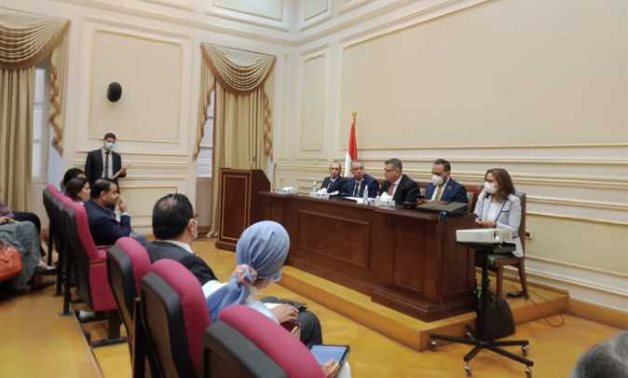
Egypt’s Supreme Standing Committee for Human Rights (SSCHR) and the Parliamentarian human rights committee on Sunday hold a meeting – Press photo
CAIRO – 10 May 2021: Egypt’s Supreme Standing Committee for Human Rights (SSCHR) and the Parliamentarian human rights committee on Sunday held a meeting to review the first draft of the national strategy for human rights.
Ambassador Alaa Roshdy, assistant foreign minister, said the SSCHR is keen to enhance communication and coordination with the Parliament’s human rights committee to achieve the desired solidarity with the national efforts related to advancing human rights.
Roshdy, also the acting SSCHR head, affirmed that the initiative to create the national human rights strategy definitely reflects the political will to push forward the relevant national efforts.
Roshdy noted that the committee adopted an expanded consultative approach while preparing the strategy’s draft.
He added that the draft adopts a comprehensive and serious approach in enhancing human rights and basic freedoms. This approach is characterized with clear vision and strategic planning, Roshdy said.
The assistant foreign minister said the strategy is also considered as an ambitious national road map in the field of human rights and an important tool for self-development in this regard.
The time frame of this strategy extends for five years (mid-2021 until mid-2026) and comprises four main work axes that complement each other, Roshdy said.
These aces are the civil and political rights; the economic, social and cultural rights; human rights of women, children, disabled people, youth and the elderly; and capacity building in the field of human rights.
The strategy tackles the most important strengths, chances and challenges related to each of the four axes, Roshdy said.
The Parliament members hailed the initiative to prepare the national strategy draft.
The meeting has witnessed a constructive and open dialogue to listen to the MPs’ suggestions and opinions about the draft. The attendees also discussed a number of important issues related to human rights.
The strategy is a new start for strategic planning in the field of enhancing human rights, Roshdy affirmed.
He added that some of the relevant issues require further review with the various concerned parties, including the human rights committee in the parliament, the civil society and the National Council for Human Rights to define the best approach to deal with them.
Founded in 2018 as per a decision by the premier to set and follow up on an integrated approach for protection of human rights, the SSCHR has been is charge of preparing the national strategy for human rights since 2020.
Since then, the SSCHR has gathered the future plans and programs related to human rights in coordination with the ministries and concerned authorities.
The SSCHR also studies the national action plans and strategies already adopted in various fields to achieve integration between them and the strategy. This can be achieved through building on the objectives, programs and activities the strategy contains.
During the preparatory stage, the SSCHR was keen to study the national strategies and action plans of human rights in a number of countries.
This aimed to shed light on the best practices and experience in the field of human rights.
The committee also studied and reviewed the final recommendations Egypt has received from the international and regional mechanisms of human rights as well as the National Council for Human Rights.
In April, Head of the Human Rights Committee in the House of Representatives Tarek Radwan said the human rights situation in Egypt is not perfect but many have been achieved to develop them.
Egypt has been keen over the past years to respond to accusations regarding human rights violations, asking the international and regional bodies concerned to get their information from credible sources.
President Abdel Fattah El-Sisi has affirmed in many occasions that human rights are not limited on political rights. However, he affirmed that the state does not have a problem with constructive opposition.
Concerning human rights violations in prisons, the state has opened prisons for occasional visits by human rights activists and local and international media to check the situation of inmates.
Comments
Leave a Comment